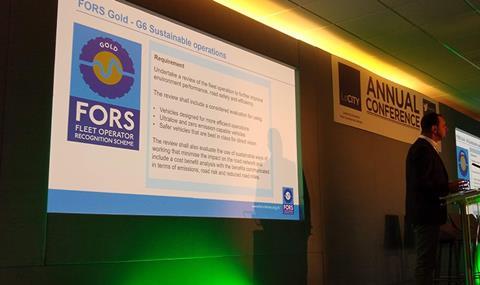
FORS has revealed plans to mandate stronger environmental requirements as part of its two-yearly refresh, which comes into force on 14 January 2019.
Speaking at the LoCITY annual conference earlier this month, Glen Davies, transport consultant and ex freight and fleet programme manager at TfL, explained the rationale behind FORS' regular updates: "Industry is a movable feast; therefore standards have to move as well," he said.
Full details of the scheme's new standard 5.0 will be announced in the autumn, but Davies highlighted some of the key requirements.
For bronze, operators must show evidence of monitoring fuel consumption and environmental impact, outline commitment to environmental performance and name a fuel and emissions champion.
For silver, operators must record total distances travelled by VRM (vehicle registration mark), as well as total fuel used by fuel type and VRM. This data will be used to callculate and report CO2, NOx and PM emissions.
Additionally, they must showcase procedures that commit to reducing fuel consumption and minimising environmental impact. This will be achieved by indicating proof of the fuel and emissions champion’s competence, details of fleet performance management and fuel efficiency and emission-reduction initiatives that are in place or planned.
Read more
- Northumberland to champion Clocs and Fors
- Fors must be cultural, not just a ‘badge’, warns transport lawyer
- Majority of subbies must now have FORS to tender for contracts
To hit the gold standard, the operator should have data covering the previous 24-month period to provide a year-on-year comparison, indicating total distances travelled by VRM and total fuel used by fuel type and VRM. Year-on-year operational improvements must be shown.
Furthermore, operators will need to undertake a review of the fleet operation to further improve environment performance, road safety and efficiency. This review should include exploring ultra-low and zero-emission vehicles, as well safer vehicles that are best in class for direct vision.
There should be a cost benefit analysis with the benefits communicated in terms of emissions, road risk and reduced road miles.
Davies also stressed to delegates the importance of ensuring operators trained their fuel and emissions champions with relevant industry courses, citing FORS and LoCITY options as a good starting point.
Once the scheme is rolled out next January, operators will be given a transition period to meet the new requirements before it becomes enforceable later that year.












